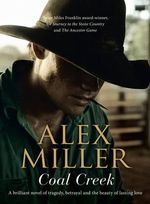It wouldn’t be an end-of-year blog without selecting my ‘book
of the year’.
Books do different things for us at different moments in our
lives. Sometimes, they are a life buoy to cling to – like The Rosie Project by Graeme Simsion which I read concurrently with
my daughter while she was in hospital. It was the perfect book at the time –
full of humour, irony and hope – the perfect antidote to grief and worry. I
also had the pleasure of attending one of Graeme’s workshops at the Brisbane
Writers Festival in September. With more than 15 takeaway tips, it was well worth
the time and money.
Then there was
Educating Alice by Alice Greenup. This one took me back to my own rural
roots, and while we followed divergent paths and while Alice’s story of city
girl turned award-winning beef producer amazed me, it made me realise that I
had, in fact, chosen the right path for me. I met and interviewed Alice at an
event I emceed this year, and she truly is a generous and warm-hearted dynamo.
I picked up Lightning
by Felicity Volk at the airport this year and found it to be a well-written, thoughtful
and multi-layered book for this debut novelist – one which I would highly
recommend to book clubs.
I thoroughly enjoyed Peter Carey’s Chemistry of Tears. I found this book to be more accessible than
some of his others and I had the pleasure of meeting my idol at the Byron Bay
Writer’s Festival.
I re-read Life of Pi by
Yann Martel for book club earlier this year (as a movie tie-in) and found our
two-hour book club meeting could hardly do this superb novel justice with its
hidden meanings, symbols and religious allusions – a book definitely worth
revisiting.
Sweet Tooth by Ian
McEwan failed to excite me the way Atonement,
Saturday and On Chesil Beach did.
I found the Cold War intrigue and unlikely love story to be a bit dry, and I
suspect McEwan will always be known as the guy who wrote Atonement which, when you think about it, isn’t so bad. By the way,
everyone must read Atonement.
Khaled Hosseini’s latest And the Mountains Echoed showed The Kite Runner author is no one-hit wonder. And the Mountains Echoed was a wonderful read with an interesting
style. I found it to be almost a collection of stories, some of which connected
while others did not, but beware of the ending – it was incredibly sad,
beautiful and wistful.
At my daughter’s recommendation, I set Chris Cleave’s 2005
debut novel Incendiary for book club
in August. He wrote The Other Hand (released in the US and Canada as Little Bee). Incendiary was written in a female first-person epistolary style
and Cleave never strayed once from the voice of … (we never learn her name) and
her class. Well done, experimental, but incredibly effective for Cleave’s first
effort.
Questions of Travel by
Michele de Kretser - I’m sorry I couldn’t
enjoy her Miles Franklin award-winning accomplishment. Too many metaphors
really do spoil the broth and why write in a too-clever way when simplicity is
enough? A question of personal taste, I think.
Ruth Ozeki, Canadian Zen Buddhist priest, was another author
I met in my role as an artist liaison volunteer at the Writers Festival this
year. Short-listed for the Man Booker Prize, A Tale
for the Time Being will have wide appeal, that is, to the mature reader and
youngsters alike – literature lovers, science geeks (Shrodinger’s cat is
explained in full), and for those who just want an easy read.
As I always find, there are just too many books and so
little time. Coal Creek by one of my
favourite Australian authors Alex Miller and the master Tim Winton’s Eyrie I am yet to read. I have just
managed to sneak in The Narrow Road to
the Deep North by Richard Flanagan and it truly is a masterpiece by an
author who is as witty as he is deeply serious – as a person and as an author,
this Tasmanian epitomises what Australia is today, that is ebullient,
intelligent (yes, I believe we are), confident and conscientious about environmental
issues he cares deeply about.
But, this year’s standout for me would have to be Burial Rites by Hannah Kent. It is about
Agnes Magnusdottir, the last woman executed in Iceland. Okay, so we know what
happens, but the way young (27-year-old) Kent brings Agnes to life is the real
triumph here. I love the familiarity of books in how they highlight the human
condition in a way that we all feel but have seldom been able to articulate.
But I also love books that take me to another place and time – that teach me
something, that subtly challenge me to look at the world in a different way – books
that change and shape who I am. Burial
Rites and The Narrow Road to the Deep
North did that for me this year. So I guess, in the end, it’s a tie.
Merry Christmas, everyone. Above all, I wish you the peace and quiet to lose yourself in a good book this festive season.






